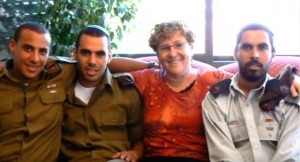The following is an excerpt from Miriam’s Song (Gefen Publishing House, 2016):
 I remember the exact time. Bat-El called from the army, we wished each other Shabbat shalom, and with the phone in my hand, I banged my head on the door of the kitchen cabinet.
I remember the exact time. Bat-El called from the army, we wished each other Shabbat shalom, and with the phone in my hand, I banged my head on the door of the kitchen cabinet.
I shouted to Bat-El on the phone: “God, I just hit my head really hard!” and hung up at once.
I clutched my head in my hands and continued to shout, “God, what a bruise! What a bruise!”
I sat down, hands holding my head, and burst into tears.
Avihai and Elyasaf checked my head and said, astonished, “Mom, we can’t see any bruise. We don’t know what bruise you’re talking about.”
But I kept wailing. I sat in the corner of the living room on the easy chair, under the photos of Uriel, grasping my head.
Then I calmed down. I was sitting in the same chair in which I had sat when they came to tell me about Uriel. Suddenly, my neighbor Eti walked in. In a few minutes Shabbat would begin, Shabbat Hagadol, the Shabbat before Passover. Why was she coming to my house?
I looked at her, and she looked at me, and we were both silent. Inside, my mind was churning: Why in the world was the neighbor coming to see me on this Friday afternoon? Didn’t she have last-minute preparations to do before Shabbat Hagadol began?
She told me about a certain problem, and I calmed her and said that everything would work out fine. Then, in a shocking outburst, without a word from her, I screamed at her: “Have you come to tell me something? Did you want to tell me something about Eliraz?”
I have no idea why I said that to her. Mother’s intuition, I guess.
“Eliraz is wounded,” she said.
 “Thank God!” I said. “Wounded.” Like one possessed, I rose from the easy chair to get dressed and go to the hospital. I never imagined that at the top of the stairs outside, just a few yards away, the street was already full of people.
“Thank God!” I said. “Wounded.” Like one possessed, I rose from the easy chair to get dressed and go to the hospital. I never imagined that at the top of the stairs outside, just a few yards away, the street was already full of people.
“I know,” I said, without being asked. “Eliraz is wounded. I’m getting dressed. Do you by chance know which hospital he’s in?”
No one answered. Instead, everyone gave me strange looks.
I tried calling Liat, the contact officer for wounded soldiers, but she didn’t answer.
I tried calling Eliraz, but he didn’t answer.
I called a few other people in my cellphone contact list, but no one answered. Hadas was the only one who answered, and she said she was checking into what had happened to Eliraz. But Hadas already knew, and she was on her way to tell Shlomit.
Something was tearing at my heart. Why wouldn’t anyone answer me?
“What’s wrong with everyone!” I shouted.
Then Avihai came in. He had gone to immerse himself in the mikveh before Shabbat, and someone had called him. Apparently he already knew.
“Sit down, Mom,” he said. “Sit down. They’re checking into what’s happened to Eliraz.”
At that moment, my legs turned into stone. I kept repeating, “Eliraz is wounded, Eliraz is wounded.” I repeated this out loud, even though deep inside, I knew that he was dead. It was like I had two minds. One knew the truth, while the other tried to hold on to hope, to illusion.
I prayed to the Holy One, blessed be He, to take me to him.
“My Eliraz is alive. My Eliraz can’t die. Eliraz…”
Out of the corner of my eye, I noticed one of our friends, who was then inside the house, peeking outside. I realized he was waiting for the military representatives to come to inform me. Then, like a crazy woman, I ran to the front door, locked it, ran to the back door, and locked it securely as well. I closed all the blinds, and shrieked, “No one’s coming inside this house, and no one’s leaving, either!”
I stood before the photo of Eliezer that hangs in the entranceway, and wailed, “What have you done to Eliraz! You went up there in order to protect him! I’m here, down here, to watch over all the rest!” I kicked the wall with all my might.
Then I went back to the easy chair and collapsed into it. I knew, and I didn’t know. I didn’t know, and I knew.
At five thirty, after Shabbat had already begun, when the military representatives arrived, they found the table set for Shabbat, down to the white tablecloth, and the house ready and kosher for Passover. “This is an ordinary house!” I shouted. “A normal house! One family can’t lose two sons! Why, God?! Why me?!”
They stood before me, and I closed their lips with my fingers. I begged, “Don’t tell me. As long as you haven’t said anything, my son is still alive.”
They tried to speak. After all, it’s their job. I knew that the three angels had visited Abraham to announce that his wife Sarah would give birth to a son, while my three angels had come to inform me once again that I no longer had a son.
“Maybe you’ve got the wrong address?” I suggested. “Or the wrong last name? It doesn’t make sense for two sons from the same home, from the same family, to be killed.” Not that I wanted another mother to receive the terrible news; I simply couldn’t believe that such a disaster could take place.
I wouldn’t let them speak.
“Miriam,” one of them said, trying to pull my hand away from his mouth. “I have to do this.”
“Please, tell me he’s wounded,” I wailed. “Gravely wounded…”
Even when they read me the prepared text that they have to say, I screamed, “I don’t believe it!”
Then I called Shlomit, Eliraz’s wife.
“Shlomit,” I said, “There are people here saying that something’s happened to Eliraz. What’s happened to him?”
Shlomit replied with words that I’ll never forget: “Now I’m like you.”
“No!” I cried. “You won’t be like me! You won’t be a widow!”
Then I understood. My son Eliraz was no more.
Miriam Peretz tragically lost two sons while they served in the IDF. She has become an Israeli national symbol of resilience and faith as she dedicates her time and energy to volunteer work. Miriam speaks in Israel and abroad, inspiring and strengthening others with her story of tragedy and determination to keep living. The newly published Miriam’s Song (Gefen Publishing House, 2016) is a translation of the Israeli bestseller which tells her life story. Miriam Peretz will be visiting NY under the auspices of the OU Israel and Gefen Publishing House from March 10 – March 17. For details on public events, click here.
The words of this author reflect his/her own opinions and do not necessarily represent the official position of the Orthodox Union.